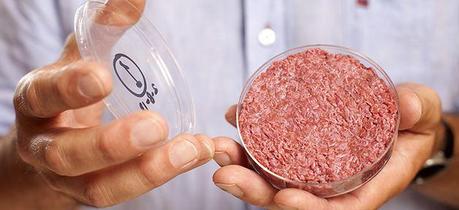
This week on Monday 5th August 2013 the world’s first lab-grown beefburger was cooked and served to a live audience in London under the glare of the world’s media. Hailed by experts as an exciting step towards food security, but slammed by many as something straight out of science fiction, ‘cultured meat’, or ‘lab meat’, is the subject of hot debate.
I’ve been vegan for many years so like many people my initial thoughts were of repulse, but according to my favorite charity Compassion in World Farming and their RAW campaign, the test-tube burger which was grown in a lab from the stem cells of a cow, could herald a new era of meat production as synthetic meat could prevent the future suffering of millions of farm animals and stop the pollution factory farming causes.
Can ‘cultured’ meat help feed the world?
With the world population predicted to rise to around 9 billion by 2050, experts believe that food production must increase dramatically. The developer of the lab-grown burger, Professor Mark Post from the University of Maastricht in Holland, hopes that artificial meat could meet the future global demand for meat.
He says that: “The result of years of research, the breakthrough burger offers what experts believe could be a sustainable solution to the problem of feeding a growing population that’s more meat-hungry than ever. The current system of intensive livestock farming is threatening the environment, human health and the welfare of millions of animals, and alternatives need to be found.”
Compassion and RAW agree that cultured meat therefore has the potential to be part of the solution to world hunger. According to the BBC, a study in the Environmental Science & Technology Journal found that lab beef uses 45% less energy than farming cattle, produces 96% fewer greenhouse gas emissions and requires 99% less land. These figures are simply too significant to be ignored.
Read RAW’s full blog on ‘Cultured Beef: ‘Frankenburger’ or Food Saviour?’ at: www.raw.info/latest/cultured-beef-frankenburger-or-food-saviour
But would you eat a test tube beefburger?
Compassion’s CEO Philip Lymbery, when asking if he would eat a lab-grown burger, says that he would. He says “The cost to the environment of industrial meat production is vast; a third of the world’s cereal harvest and most soya are destined for animal factories with huge inefficiency; a fraction of the calories and protein value of the crops is returned as meat, milk or eggs. To give a sense of scale; if the arable crops used to provide animal feed were planted in a single field, it would near cover the entire land surface of the European Union… To me, lab-produced meat has the scope to be the real win-win scenario for animals, people and the planet“.
Many people will simply be ‘yucked out’ by the thought of eating test tube meat, but as Jason Matheny from one of the companies involved in the research has commented, “the yuck factor should really be focused on conventional meat and the way it’s produced right now which is simply unhealthy, unsafe and unsustainable”.
Read Phillip Lymbery’s full blog post to see why he would eat lab-grown meat: www.acompassionateworld.org/2013/08/would-you-eat-lab-grown-meat
Eat less meat, but better meat
Personally I feel that lab-grown meat still sounds completely unnatural and unnecessary – the fact that humans have such an insatiable desire for meat that is so inhumane and threatening to our planet and very survival that we have to resort to ‘growing’ meat in labs, when we can live perfectly healthily and happily on a plant based diet, just seems obsurd and against nature. However, if it means that billions and billions of animals will not have to suffer miserable lives and/or premature deaths just in order to sustain what is an unnatural and unsustainable demand by humans in developed countries like ours, and to help people in poor third world countries who are starving as they don’t have enough food, then lab-grown meat seems a far more humane and environmentally sustainable option, and may help people question the whole system of our current food production.
But, as RAW also commented this week: “The truth is that we need an arsenal of tools to overcome predicted food shortages. So alongside this triumph of science, which may or may not become mainstream, people everywhere should be looking to eat less but better meat. Not only is this option cheaper, but it’s good for us and the planet, and can get underway today.”
Remember that every small step we take today as individuals and families to lead a more sustainable life, can lead the way for others and make a big difference to our planet (and make you feel good too!).
Let us know what you think!
Eating less meat, that is free-range and organic, is a great way to help the planet and to save money, plus there’s loads more tips on Sustainable Living here as well >>

